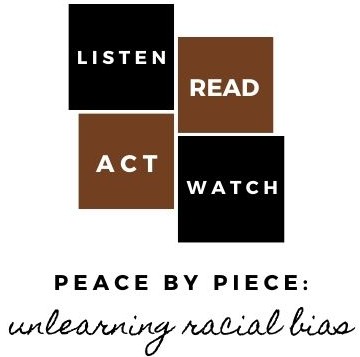This post is the conclusion of a year-long series. If my work is helpful for you, consider a contribution through Patreon or Venmo to support this crucial work of unlearning racial bias.
You may remember that Piece 1 was all about Pecola Breedlove, the heartbreakingly innocent protagonist of Toni Morrisson’s stunning debut novel The Bluest Eye.
Now that we have arrived at the end of this journey to constructing peace by unlearning racial bias, we will return to Ms. Morrison’s work to spend some time with Beloved.
Told in broken flashbacks, Beloved unfolds to us the story of Sethe, a formerly enslaved woman now living in freedom with her daughter Denver. When Paul D. – a formerly enslaved man whom Sethe knew from her days on the plantation – appears on Sethe’s doorstep, the mysterious ghostly encounters with which Sethe and Denver have become accustomed materialize in the form of a young woman who says her name is Beloved.
As time passes by, it becomes clear that Beloved was the daughter Sethe slew rather than seeing her become enslaved. Years earlier, Sethe and her family had escaped from a plantation, only to be tracked down and threatened with capture and re-enslavement.
Unable to bear the thought of her children returning to slavery, Sethe attempted to kill all of her children, but she only succeeded in killing Beloved.
In Beloved, Morrison offers her take on what might have happened to Margaret Garner had she not been returned to bondage after her escape, a hypothetical window into the soul of a real-life woman who killed her young daughter so she would not return to slavery.

Beloved is equal parts ghost story, love story, and indictment.
How often, when we learn historical facts like the existence of slavery in this country, do we learn the names and stories of real humans like Margaret Garner?
In the same way that some families carry with them the memory of hurt inflicted on their members from many generations ago, Black Americans – particularly those of us who cannot trace our ancestry to any country of origin other than this one – carry with us the trauma inflicted on our ancestors.
Even when we don’t know their names and their stories, we carry the ghosts of their memories.
And just like Beloved re-entered Sethe’s life when Paul D. brought Sethe’s past with him to Sethe’s doorstep, every time Black Americans see an act of race-based violence in the news, our own ancestral ghosts appear.
To remind us of their presence.
To remind us that we all are connected.
To spur us on toward the systemic and cultural reforms necessary to put their spirits at ease.
It is only when we pause to consider humans and not just history, that we will begin to understand the gravity and necessity of unlearning racial bias so we can do better, for our ancestors, for our children, and for ourselves.
I hope you’ll take the time this week to read or watch Toni Morrison’s Beloved.
And when you do, I hope you’ll consider –
- When in your life have you suffered trauma that made you begin to doubt if you are truly beloved by the people in your life?
- What events transpired before you were able to believe again that you are loved?
- What can you do today to make the people of color in your life believe that they are seen and loved in the fullness of their human experience?
- Is it possible to build real, lasting peace without truth and empathy?
Creating peace is an ongoing, recursive process.
And even if at times we find the recursive circle to be spinning us dizzy, let us never lose heart as we remember always that even one step in the direction of building a more peaceful world is worth the spinning, worth the work.
Know that sometimes you will get it wrong before you get it right.
That at times you will be hurt, startled, shocked, moved, angered.
Never stop trying to unlearn racial bias, though.

A brighter future depends on your choice to pay attention to your family, community, and country, and your active work each day to keep constructing a more inclusive, truthful, and peaceful world, one piece at a time.
Thank you for choosing this journey.
